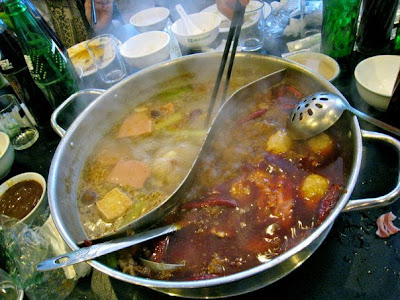However, I am proud to say that I have only had American food on one occasion (Dairy Queen duh!) and Sushi one night for an amazing all you can eat/drink deal in downtown Shanghai. The food in Shanghai, and especially around my school is amazing. I realized pretty quickly that Chinese food in the states is hardly authentic, and the culture of street food is heavily prominent here. During our first week in Shanghai, our program did a very good job of taking us to several different types of Chinese restaurants. Everything in China is family style unless you are taking it to go, so it worked well for our group of 30 people.

The picture above shows a type of cuisine here called hot pot. Its somewhat similar to fondue, however, they serve you raw meats and vegetables, which you then throw in a hot broth to cook. Mostly everywhere they serve dumplings, buns with meat and vegetable filling, and all the traditional Chinese dishes just better. They have a specialty dumpling here in Shanghai called xiaolongbao. It is a broth dumpling that has soup and a little meat in it and is very tasty. You can find them everywhere, but only for breakfast and dinner. Here a fully-staffed kitchen makes xiaolongbao the entire day in a food mall near my school.

Some mornings, on the way to class, we go to a bakery where there are pastries, and coffee for very reasonable prices. I rarely spend more than $4 a day on food here. Street food is amazing, whether it is roasted sweet potatoes and corn, or a onion crepe-pancake filled with whatever you want and wrapped to look like a burrito. My roommate and I have been very adventurous by eating at the same vendor 3 nights in a row, which is located about 5 feet from our apartment! Here we pick any raw veggies, meat, tofu, bread, or fish that we want and they grill it and spice it right in front of us. It's super fresh and one of the more healthy options. My favorite dish so far is called 茄子, and it is a garlic eggplant dish that is sooo wonderful. So, in the words of a special someone, I'm giving China the "benefit of the doubt," because so far I love it here, and my culinary adventures are only enhancing that feeling.


Now I know what most of you who know me well must be thinking...How am I satisfying my sweet tooth, or more honestly, my entire mouth of sweet teeth. I'm not going to lie, it's been rough. Chinese enjoy a hot soup of apples and bananas for dessert, or sometimes a sweet rice snack. And you probably guessed that there is no fro-yo, ici, yola, yopo, or anything resembling those places near my school. At some point I'll cave in and go to the city just for a sweet something, but in the meantime at least they have boba (bubble tea) at every corner, and for that I can be thankful. I tried a red bean dumpling the other day and was pleasantly surprised :) I guess it hits me the most when I hear stories of mrs. munchies (yes, kyle and matt...I AM jealous), and I am tempted to walk to the bakery 15 minutes down the road. Luckily, I have more willpower than I thought and I may just lose a couple sweet teeth in my travels abroad.

Chinese Word of the Day: 茄子 (qie zi: eggplant) pronounced: chi-yay-zi




